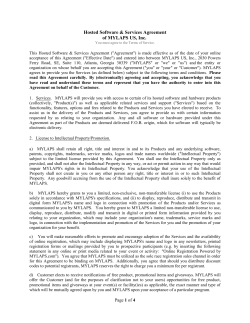
Children’s Hospital of Atlanta Supported or Collaborative Research Frequently Asked Questions
Children’s Hospital of Atlanta Supported or Collaborative Research Frequently Asked Questions 1. What is the purpose of Intellectual Property Agreement between GTRC and Children’s Healthcare of Atlanta? Georgia Tech and Children’s have a common interest in collaborative research that brings clinicians and academic scientists and engineers together to solve important problems in pediatrics and in the development of technological solutions for improving children’s health. Potential collaborative research efforts can occur in many disciplines from development of new devices and technologies to medical records informatics to healthcare systems, to name just a few. The Intellectual Property Agreement is a companion to the Master Research Agreement and establishes a framework for efficient dissemination of new intellectual property that arises from research involving employees of both Georgia Tech and Children’s or that uses significant resources of both entities. 2. Does the Georgia Tech – Children’s Healthcare of Atlanta Intellectual Property Agreement influence my relationship with current or future research sponsors? The Intellectual Property Agreement signed by Children’s and GTRC does not inhibit a Georgia Tech researcher from seeking funding from sponsors – whether federal agencies, foundations, or companies. In fact the Georgia Tech – Children’s collaboration greatly benefits from the inclusion of third party sponsors. It is, however, important to let the contracting officer know that your research is part of the Georgia Tech – Children’s collaboration to ensure any intellectual property access rights that may be granted to the sponsor in the contract are consistent with the Intellectual Property Agreement between GTRC and Children’s. When proposing to federal sponsors the relationship with Children’s should be noted in the proposal and the roles of Children’s employees and the resources committed should be fully described. In addition to facilitating post-award administration, such collaborations with clinical care providers generally strengthen proposals. 3. I have graduate students working on projects that utilize resources of Children’s, is there any special considerations as the principal investigator I should be aware of? No. Graduate students are encouraged to participate on such projects and are free to publish in a manner consistent with any sponsored agreement and the norms of an institution of higher education. 4. My understanding is that Georgia Tech does not normally claim ownership interest in undergraduate students’ intellectual property unless they are performing research under a sponsored research project. I advise undergraduate students who may use resources or 2014-04-25 interact with employees of Children’ – will they still be able to own their intellectual property that results from these projects? Under Georgia Tech’s Intellectual Property Policy, undergraduate students do not normally have an obligation to assign intellectual property rights to GTRC unless they are employed or otherwise supported in the performance of research. The Intellectual Property Agreement between Children’s and GTRC requires that Georgia Tech students assign their intellectual property rights to GTRC prior to utilizing Children’s resources or participating in collaborative research. 5. My research will require collaboration with a colleague who is neither a Georgia Tech nor Children’s employee. Is there any special consideration I should be aware of? There are no restrictions on collaborating with others while utilizing Children’s resources or participating in collaborative research with Children’s researchers. Any agreements GTRC enters into with the collaborator’s university will need to be consistent with the Georgia Tech – Children’s Intellectual Property Agreement. Contact your contracting officer to ensure that the collaboration with employees of Children’s and/or the use of Children’s resources is noted in the proposed collaboration with a third party. 6. I have developed intellectual property under a project that has utilized resources of Children’s – do I need to disclose that on the invention disclosure form? Even if it was non-financial resources? Yes. If Children’s researchers had an inventive contribution to the intellectual property or were authors, they should be listed as inventors/developers on the invention disclosure form. If Children’s resources were utilized in the development of the intellectual property, Children’s needs to be listed as a sponsor on the invention disclosure form. 7. The phrase “resources” has been used several times now, what does “resources” entail? The Georgia Tech – Children’s Intellectual Property Agreement defines resources as any resources of Children’s including but not limited to laboratories, facilities, space, equipment, supplies, services, personnel, patient data or funding from internal or external sources that have an equivalent value of $5000 or more. Any funding or other resources provided by Children’s Pediatric Research Trust shall be deemed to be resources of Children’s. 8. In the evaluating and patenting my invention disclosure, are there any changes to your office’s process or decision making that as an inventor I should be aware of? Evaluations of jointly owned inventions will be completed by both Children’s and GTRC working independently but collaboratively. Thus, criteria and internal procedures GTRC utilizes in the 2014-04-25 evaluation process may not vary for these inventions from those that you previously disclosed to our office. 9. I am interested in starting a company with intellectual property that resulted from support or resource utilization of Children’s – are there any issues with me doing that? Your start-up company will negotiate with both Children’s and GTRC, with one party being the main point of contact, but otherwise, procedures for the formation of and negotiation with start-ups remains unchanged. 10. Would such IP still qualify for GTRC’s GT:IPS™ license? GT:IPS is a Georgia Tech program and thus the pre-negotiated GT:IPS license agreement has been accepted by GTRC only. However, GTRC will ask Children’s on a case by case basis whether the GT:IPS license might be acceptable for individual opportunities as they arise. 11. If GTRC was to take equity in my startup, would both GTRC and Children’s be shareholders or would GTRC hold the equity in its name until a liquidity event? While the Georgia Tech – Children’s Intellectual Property Agreement doesn’t require GTRC or Children’s to take stock in a start-up company as consideration for a license agreement, if stock is taken, the amount of stock is divided equally between GTRC and Children’s and is to be issued to each party in their own name under separate stock agreements. 12. My understanding from the memo is that Georgia Tech and Children’s will share in both expenses and licensing revenue from the commercialization of the intellectual property. Will I still receive my normal share of any licensing revenue? Yes. The inventors’ or contributors’ will receive the distribution he/she would be entitled to under his/her respective Intellectual Property Policy before split of any income. 13. Will my unit still receive its normal share of any licensing revenue? No. GTRC’s share and the unit’s share (under Georgia Tech’s Intellectual Property Policy, that share is anywhere from 17%-33%) will first be split with Children’s and then distributed in accordance with Georgia Tech’s Intellectual Property Policy. 14. What are the procedures for the exchange of confidential or proprietary Information with Children’s? A Mutual Non-Disclosure Agreement has been negotiated between GTRC and Children’s, but to be protected under the agreement, as is the common practice with any non-disclosure agreement, the information exchanged must be identified and formally recorded. As is the 2014-04-25 norm, information must be marked as confidential or proprietary at the time of disclosure or if orally disclosed, identified as confidential or proprietary and summarized in writing no later than 30 days after disclosure. Please contact the Office of Industry Engagement with any questions or to initiate formal documentation of an exchange of confidential information, preferably before the exchange takes place. 2014-04-25
© Copyright 2025













